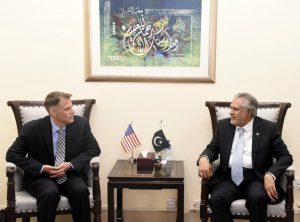The United States feels reassured by Pakistan of its dedication to the IMF.
After making a new debt repayment of $500 million, the country’s reserves decreased to just a half month’s worth of import coverage.

ISLAMABAD: Pakistan gave the United States reassurance on Wednesday that it was still committed to the International Monetary Fund (IMF) programme as the nation’s reserves fell to just enough to cover one month’s worth of imports following another $500 million debt repayment.
According to a formal statement from the Ministry of Finance, Finance Minister Ishaq Dar met Robert Kaproth, Deputy Assistant Secretary of the US Department of the Treasury for Asia.
The status of the IMF programme was discussed by both parties during the meeting. Dar informed the US official of Pakistan’s efforts to reactivate the IMF programme.
Dar said to Robert, “Despite difficult economic conditions, the government is concentrating on making things better and implementing reforms in all sectors, including the energy sector and capital market to achieve economic growth and development.
Pakistan has been asked by the IMF to implement a market-based exchange rate, remove import restrictions, raise taxes, and raise electricity prices. However, the government has not yet implemented any of these measures and is holding off until there has been a formal engagement with the international lender.
The meeting was held as foreign exchange reserves were sharply declining, falling to just two weeks’ worth of import coverage, the lowest level in more than nine years.
Pakistan paid $500 million to a Chinese commercial bank this week, which has caused the reserves to drop to a level that is by no means comfortable by any standards.
The average monthly import bill for Pakistan is $5.3 billion, and on Tuesday, reserves were less than $3.3 billion. Both the $2 billion cash deposit from Saudi Arabia and some upcoming disbursements from Chinese financial institutions are anticipated by Pakistan “much before end of January.”
The Ministry of Finance was instructed by Prime Minister Shehbaz Sharif last week to restart the IMF programme as soon as possible with the condition that the low-income groups be exempt from the burden that the country will eventually have to bear.
Pakistan would fulfil its obligations under its international debt, according to the finance minister, who also explained why his country decided against the Paris Club debt restructuring. Dar added that Islamabad had made on-time debt repayments during the meeting.
In the past, the finance minister requested assistance from the US to soften the IMF’s stance, but the US advised Pakistan to follow the path of fiscal restraint.
According to government insiders, the finance minister believed that money smuggling to Afghanistan and Iran was placing pressure on the rupee’s parity with the dollar.
Mukarram Jah, a member of the Federal Board of Revenue’s Customs Operation, stated to The Express Tribune this month that only 10% of the devaluation of the rupee was attributable to smuggling.
The rupee-dollar parity did not change much on Wednesday, contrary to market expectations, and the local currency closed below Rs231 to the dollar.
The US deputy assistant treasury secretary appeared to be in the country on a reconnaissance mission to learn more about the causes of the nation’s boom-and-bust economic cycles and its adherence to the IMF programme.
The US deputy assistant secretary was joined by senior macroeconomist for Pakistan’s Department of Treasury Eva Ghirmai and financial attaché Larita Bolden.
Dar received assistance from Dr. Aisha Pasha, Minister of State for Finance, Tariq Bajwa, Special Assistant to the PM on Finance, and Hamid Sheikh, Secretary of Finance.
According to the finance ministry handout, Dar briefed Robert on the country’s economic prospects and told him that the current administration inherited a weak economic foundation.
According to the finance ministry, he claimed that because of “pragmatic measures taken by the government, the country is destined for progress and development.”
The government wanted to put the economy back on the right track while upholding its obligations to other nations, the finance minister also told the US delegation.
He also discussed with Kaproth the effects of the floods in Pakistan on the nation’s economy.
According to the finance ministry, “He (Dar) stressed that the government is handling all challenges with full commitment.”
Kaproth emphasised the positive ties between Pakistan and the US and expressed faith in the government’s plans and policies for achieving economic and financial stability.
On matters of commerce and finance, he offered his assistance and cooperation.










































